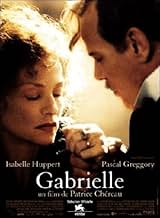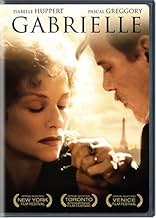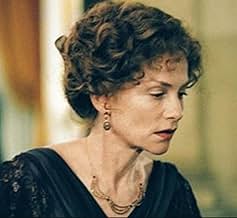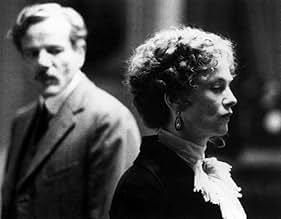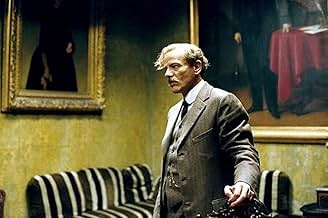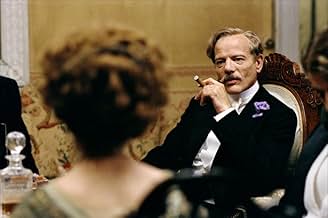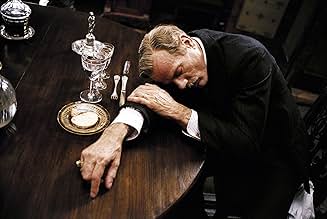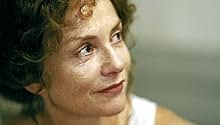Gabrielle
- 2005
- 1h 30m
IMDb RATING
6.2/10
2.2K
YOUR RATING
The marriage between Gabrielle and Jean begins to fray after the discovery of a letter that belongs to Gabrielle.The marriage between Gabrielle and Jean begins to fray after the discovery of a letter that belongs to Gabrielle.The marriage between Gabrielle and Jean begins to fray after the discovery of a letter that belongs to Gabrielle.
- Director
- Writers
- Stars
- Awards
- 3 wins & 6 nominations total
Florent Bigot de Nesles
- Invité
- (uncredited)
Philippe Calvario
- Guest
- (uncredited)
- Director
- Writers
- All cast & crew
- Production, box office & more at IMDbPro
Featured reviews
I saw this dark oeuvre yesterday at the Boston French Film Festival at the MFA.It was chosen to be the Opening night Film and was sold out.The director was present and spoke at length about what drew him to make the film and what was important about it- for him. I felt the film-making was fascinating. From the opening sequence, where the footage in the train station is SO realistic in its early 20th c. appearance, and throughout the film, I found the cinematography to be lush, stylized, extremely well-framed and riveting .It is a perfect voice for the story. The actors are always IN YOUR FACE and this fact, combined with an economic and well written script, heavy dark music, tremendously accurate and effective set design, and spot-on acting, made for an extremely moving and interesting exploration of the story. For me, in tone and context, it felt a bit like Henry James' Portrait of a Lady (and probably works by Ibsen and others) Isabelle Huppert and her husband are extremely wealthy, cold, unemotional,detached from themselves and others, and 'safe' in that world. Their house-where 99% of the film takes place, is a dark, heavy, classical, structured prison.(The director's background in stage directing is very evident in this film.) One little bubble bursts from that prison and then things change and the disintegration begins. It gives one a great deal to think about. My only problem with the film is the MUSIC.The music is as much an element of the film as the actors. That is not, in and of itself, a bad thing, but in the last 20 minutes of the film, it is just WAY TOO MUCH: too heavy, too loud, and too repetitive;a bit like Bruchner at his worst. But if you are able to see a DVD of this, you can turn down this overkill. If you are lucky enough to see the film live (so important for major artistic cinematography like this) you'll just have to deal with it; maybe it won't bother you so much.At any rate, the film will provide those so inclined with many things to think about and discuss. And visuals to remember. For me,I will always carry the image of Huppert, dressed in black, on that enormous settee... it's a Degas.
Joseph Conrad wrote his novella, "The Return" in tribute to Henry James, whose "The Spolis of Poynton" inspired him to write about a man who regards people as objects of ownership-- and is gobsmacked when his most prized possession, his wife, walks out on him. On the page it's a tight little chamber piece, with overtones of Ibsen and Strindberg. On the screen the great Patrice Chereau turns it into something else -- an opera in which the images sing rather than the performers. Pascale Greggory is in top form as a haute bourgeois "man who has everything" whose smugness masks a total disdain for feeling. When the superb Isabelle Huppert leaves a note to say she's leaving, the brandy decanter he drops echoes like the sword of Siegfried in Chereau's famed production of Wagner's "Ring" cycle. (Fabio Vacchi's amazing Alban Berg-like score seals the deal on this aspect of the work.) The dramatic set-to that results finds our non-hero groping for words to speak to the feelings he's never experienced before -- longing, regret, and finally grief at the loss of a love he's never allowed himself to know.
As far from Merchant-Ivory as one can possibly imagine Chereau and production designer Olivier Radot (new to la famille Chereau) place the action in a museum-like mansion where a small army of servants move about at the service of this infernal couple and their friends. Scenes of their fashionable parties suggest the Verdurins in Proust with cinematographer Eric Gauthier indulging in a color palette that makes the screen seem like a Manet come to life.
Chereau is doubtless familiar with what Georges Bataille wrote of Manet: "A little superficial perhaps, but driven by inner forces that gave him no rest, Manet was possessed by a desire for something beyond his reach which he never fully understood and which left him for ever tantalized and unsatisfied, on the brink of nervous exhaustion." That's perfect description of the emotional heart of this very great film.
As far from Merchant-Ivory as one can possibly imagine Chereau and production designer Olivier Radot (new to la famille Chereau) place the action in a museum-like mansion where a small army of servants move about at the service of this infernal couple and their friends. Scenes of their fashionable parties suggest the Verdurins in Proust with cinematographer Eric Gauthier indulging in a color palette that makes the screen seem like a Manet come to life.
Chereau is doubtless familiar with what Georges Bataille wrote of Manet: "A little superficial perhaps, but driven by inner forces that gave him no rest, Manet was possessed by a desire for something beyond his reach which he never fully understood and which left him for ever tantalized and unsatisfied, on the brink of nervous exhaustion." That's perfect description of the emotional heart of this very great film.
I've been watching & thoroughly enjoying Isabelle Huppert's films since 'The Lacemaker'. This time, what struck me was the intensity of Huppert's next-to-passive, almost casually indifferent postures of contempt for her husband. It is because of her being so minimal and apathetic that her performance harnesses its power and devastation. And this is what enhances Greggory's reactive performance as being so complementary, that of a once smug now tortured soul who slips and struggles to re-grasp a heart turned cold. He's just left grabbing air in the end. The looks on the faces of the chorus, their social clique & the servants in the troubled Hervey household says it all.
Going in, I was reminded of another story of martial discord, David Hughes Jone's 'Betrayal' but 'Gabrielle' hit me as being more incisive and oppressive than anything I've seen adapted for Pinter. I don't need to state the obvious that parlor films of this variety appeal only to those with an acquired taste. As for me, I can only say that I prefer the ice cubes that go with my scotch jagged & stinging cold like the ingredients in this film.
Going in, I was reminded of another story of martial discord, David Hughes Jone's 'Betrayal' but 'Gabrielle' hit me as being more incisive and oppressive than anything I've seen adapted for Pinter. I don't need to state the obvious that parlor films of this variety appeal only to those with an acquired taste. As for me, I can only say that I prefer the ice cubes that go with my scotch jagged & stinging cold like the ingredients in this film.
Obviously we don't all like the same things. One commentator said it was all just talk, as if that were a bad thing. I happen to love language and words, and in particular love the French language. So that is the reason I rent a movie in French. I also have a very strong aversion to "action movies" where language is reduced to "Ow! Help! Duck!" On the other hand, movies like Gabrielle where minute movements of the psyche are explored in depth by minimalistic means, these are what grip me, move me, keep me interested. I do not really think the movie is like an opera -- it was more like a french play -- the delivery and velocity of the spoken word was very much in the style of french live theater.
My only caveat is that French-ness and Conrad seem a strange mix to me. There was another French movie that was made on a Conrad text, and I had a similar reaction. Conrad is not writing about French society. And yet the action has been transplanted to France. And it seems an entirely incongruous transplant to me -- plopping the joyless uprightness of puritanical England (the only place name mentioned is "West End Station" into a such a lively Latin culture which has always had a much more relaxed attitude towards love and sex... well,to me it's just incongruous.
Nevertheless, it was an cleverly crafted movie, and the musical score by Fabio Vacchi was unearthly beautiful.
My only caveat is that French-ness and Conrad seem a strange mix to me. There was another French movie that was made on a Conrad text, and I had a similar reaction. Conrad is not writing about French society. And yet the action has been transplanted to France. And it seems an entirely incongruous transplant to me -- plopping the joyless uprightness of puritanical England (the only place name mentioned is "West End Station" into a such a lively Latin culture which has always had a much more relaxed attitude towards love and sex... well,to me it's just incongruous.
Nevertheless, it was an cleverly crafted movie, and the musical score by Fabio Vacchi was unearthly beautiful.
Gabrielle (2005) is a French film written and co-directed by Patrice Chéreau. It's based on a novella by Joseph Conrad.
Pascal Greggory plays Jean Hervey. He's a very wealthy businessman. He's healthy and apparently happy.
His wife, Gabrielle, is elegant and sophisticated, albeit aloof. Gabrielle is portrayed by Isabelle Huppert.
This movie sounded good on paper, but it just didn't work for me. Partly that's because Patrice Chéreau is better known as a theater director and the film looks more like a play than it looks like a movie.
Huppert is one of my favorite actors, but she's wrong for this role. We're told over and over that the couple has been married ten years, but Huppert looks closer to 50 when, in context, she should be 35 or 40. (Well, she was 52 at the time, and she has every right to look 50, but it's not appropriate for this movie.)
Finally, director Chéreau uses strange and unnecessary devices. He switches from black-and-white to sepia to color. He uses title cards like the old silent movies. The characters talk and talk, but nothing much gets said.
If a film isn't going to be enjoyable, it should teach us something. All I learned from this movie is that if you speak cruelly to your maids, they just have to bear it. Apparently, it's part of the job description to just endure.
I didn't enjoy any aspect of this film. It's hard for me to criticize an Isabel Huppert movie. I thought she could make it work. Not this time. Gabrielle has a dreadful IMDb of 6.4. I agree with my fellow raters and rated it 6.
Pascal Greggory plays Jean Hervey. He's a very wealthy businessman. He's healthy and apparently happy.
His wife, Gabrielle, is elegant and sophisticated, albeit aloof. Gabrielle is portrayed by Isabelle Huppert.
This movie sounded good on paper, but it just didn't work for me. Partly that's because Patrice Chéreau is better known as a theater director and the film looks more like a play than it looks like a movie.
Huppert is one of my favorite actors, but she's wrong for this role. We're told over and over that the couple has been married ten years, but Huppert looks closer to 50 when, in context, she should be 35 or 40. (Well, she was 52 at the time, and she has every right to look 50, but it's not appropriate for this movie.)
Finally, director Chéreau uses strange and unnecessary devices. He switches from black-and-white to sepia to color. He uses title cards like the old silent movies. The characters talk and talk, but nothing much gets said.
If a film isn't going to be enjoyable, it should teach us something. All I learned from this movie is that if you speak cruelly to your maids, they just have to bear it. Apparently, it's part of the job description to just endure.
I didn't enjoy any aspect of this film. It's hard for me to criticize an Isabel Huppert movie. I thought she could make it work. Not this time. Gabrielle has a dreadful IMDb of 6.4. I agree with my fellow raters and rated it 6.
Did you know
- ConnectionsReferenced in Law & Order: Criminal Intent: Blind Spot (2006)
- How long is Gabrielle?Powered by Alexa
Details
Box office
- Gross US & Canada
- $332,829
- Opening weekend US & Canada
- $30,676
- Jul 16, 2006
- Gross worldwide
- $2,775,311
- Runtime
- 1h 30m(90 min)
- Color
- Sound mix
- Aspect ratio
- 2.35 : 1
Contribute to this page
Suggest an edit or add missing content

